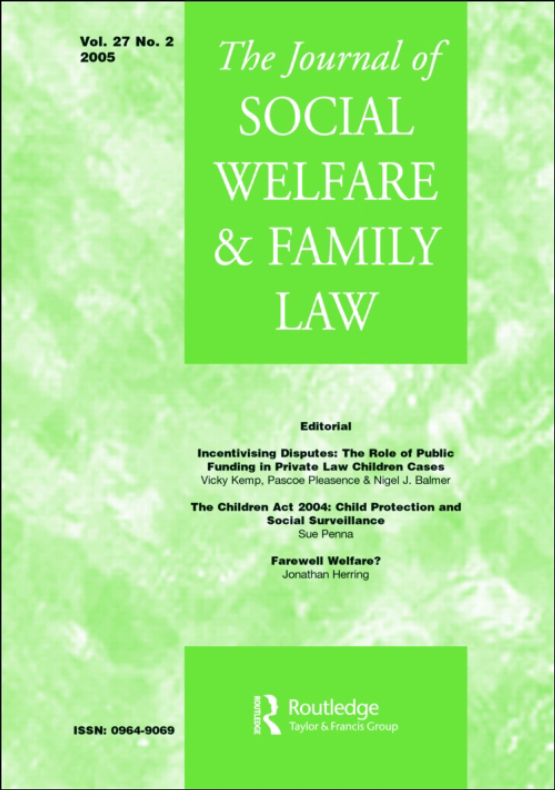Editor needed for
Journal of Social Welfare and Family Law
Deadline
About the role
Journal of Social Welfare and Family Law is currently recruiting for an editor. This role is a great opportunity for an academic with a strong research background in family law, social welfare or social policy, and who also has the commitment, drive and ability to help develop the journal. As part of this role, you will be responsible for the oversight and administration of a rigorous and proper peer review process that delivers an agreed amount of content of suitable scope and quality within an agreed publication timeframe.
Becoming the editor of a journal is a rewarding and fulfilling experience where you have the opportunity to build your own networks, develop and promote the research in your field, and be recognized as a leading figure within the academic community.
A small honorarium is attached to the role.
About the Journal

The Journal of Social Welfare and Family Law presents research and analysis of social welfare, family law and policy issues from a UK, European and international perspective. The Journal provides an interdisciplinary forum to which academics and professionals working in the fields of social welfare and family law can turn to for information, comment and informed debate.
Key features of the Journal:
- Articles
- Cases
- European Section
- Ombudsman, Tribunals and Administrative Justice Section
- Book Reviews
- Special Issues
Key Skills and Attributes
- Experience in academic publishing and familiarity with all stages of the process.
- The capacity to devote time each week to the role, and to convene and/or attend editorial meetings as needed.
- The ability to ensure all submitted manuscripts are considered in a prompt, consistent and professional manner.
- Experience of working effectively with independent peer reviewers, and the ability to read, summarize, and make decisions based on independent reviewer reports.
- A commitment to communicating promptly, consistently, and professionally with authors during the peer review process.
- A commitment to engaging promptly and efficiently with Taylor & Francis staff and suppliers to implement necessary processes and improvements.
- A strong commitment to ethical rigour as well as knowledge of the COPE guidelines and commitment to ensure that the journal adheres to strict ethical standards at all times.
- A willingness to proactively lead the journal’s section editors and advisory editors, to include arranging and leading advisory board meetings.
- Active involvement in growing and developing your academic networks.
- A vision and enthusiasm for the continuous development of the journal.
Application instructions
We would like the incoming editor to begin transitioning into the role in autumn 2025, working alongside the current editors Mavis Maclean and Emma Hitchings. They will then take over fully from the outgoing editor, Emma Hitchings, on the 1st January 2026.
Please include a CV with your application. A brief cover letter explaining your interest in the role and your vision for the journal is welcomed but not mandatory.
For any questions please contact Mavis Maclean (mavis.maclean@spi.ox.ac.uk) or Emma Hitchings (E.Hitchings@bristol.ac.uk).
Did you know?
Joining a Taylor & Francis journal as an Editor or Board member brings many personal and professional benefits.
Find more roles in your subject area with our Editor Recruitment search tool.
The journal is committed to ensuring diversity, equity and inclusion within its editorial team and decision making processes. All applications will be treated as strictly confidential, and each will be judged on its merits without bias for seniority of institutional affiliation. We do not discriminate on the basis of race, color, ancestry, national origin, religion, or religious creed, mental or physical disability, medical condition, genetic information, sex (including pregnancy, childbirth, and related medical conditions), sexual orientation, gender identity, gender expression, age, marital status, military or protected veteran status, citizenship, or other protected characteristics.

